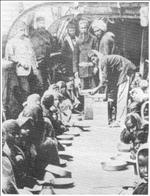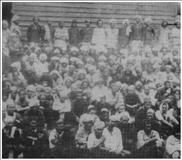Today we salute the Girmityas of Fiji on an Anniversary

Auckland, May 14, 2020
January 1, 2020, apart from heralding a new decade, should have meant a lot more to the descendants of Girmityas, the indentured labourers from India to Fiji between 1879 and 1916.
It seems very strange that perhaps the most significant Girmit historical event passed without any fanfare, recognition or celebration.
It seemed to have been missed even by the academics and guardians of Girmit history.
It is such a pity that this very significant day in the history of our community escaped notice.
Year 2020 marks the 100th Anniversary of the Termination of Indenture Contracts.
Ultimate freedom
This took place on January 1, 1920 when all Girmityas obtained their ultimate freedom.
Even those still serving their Girmit were officially declared free from their indenture contracts.
This event was even more important than abolition of indenture system in March 1917 when all recruitment and shipment were halted.
This abolition was not the ultimate termination, which only took place on January 1, 1920.
Only now I realise that the tales of indenture my Girmitya grandfather Bansi used to tell to the family made sense. We were made to believe and all history told us that Girmityas were contracted for five years. Yet, my grandfather had told his family that he finished his term in only four and half years. We paid little attention to this and had attributed it to his old age and perhaps forgetfulness.
However, now I know that my father’s old man was telling the truth.
My grandfather Bansi arrived in Fiji via SS Ganges VII which reached Fiji in June 1915.

Varying contract terms
But, as we now know, his contract was terminated on 1 January 1920. That makes it four and half years. So, the old man was not senile or suffering from dementia or any forgetfulness but was stating a historical fact that we all seemed to have been unaware of or refused to acknowledge.
My research into the arrival of the last group of ships shows that five final ships were affected by this termination. These ranged from Mutlah III which arrived in Fiji in on May 7, 1915 (4 y 7 months), Ganges VII – in which my Girmitya Bansi came in June 1915.
Therefore his termination was after four years and six months. Similarly, Mutlah IV came in August 1915 (4 years 4 months), Chenab III, which came in September 1916 (3 years 2 months) and the final ship of Girmit was SS Sutlej V which arrived in Fiji in November 1916.
Therefore, those on this last ship only served Girmit for 3 years and one month which took them to January 1, 1920 when their contracts were terminated.
The final ship from which the Girmityas served full five years of Girmit was Chenab II which arrived in Fiji in June 1914. Girmityas on all other five ships after this, arriving from May 1915 to November 1916 did not serve the full five – year term of Girmit.
Indentured labourers in these five ships totalled 4280 and they were the immediate beneficiaries of the termination, and served less than five years. As shown above, these shorter terms ranged from three years, one month to four years, seven months.

Tearful tales
In all this episode of termination, the only person who outshone all the academics and Girmit Historians appear to be a passionate Girmitya son from a rustic village of Vaqia in Ba, Fiji. He is none other than the author, Rajendra Prasad who penned tear-jerking Girmit tales, Tears in Paradise, where he revealed blood-curling violence in the Girmit era. And he rose to the occasion to write about this 100th Anniversary of termination of Girmit, first in social media, followed by an article which was published in the Fiji Times of 9 May 2020.
He stated that indenture contracts were terminated through legislation, effective from 1 January 1920 till when those recruited after abolition of Girmit in 1917 were still serving Girmit.
While this gesture freed the entire Girmitya community, it also removed the shadow of stigma that stained India’s honour and dignity as a source for supplying bonded labour under the indenture system. The realisation by Indian leaders that indenture was another form of slavery prompted them to accept the fact that before they proceeded on fight for India’s independence, they needed to terminate indenture. Hence our people were ultimately freed and were beneficiaries of this foresight of freedom – fighters in India.
Freedom from bonded labour
Therefore, January 1, 1920 heralded freedom for them, and they became free and it was a reason for celebration. He continues in his article:
“They called themselves ‘khula’ (free), a word that was taken with an assertive degree of pride, as it meant liberty and freedom lost to them since the day they became indentured workers in the colonies. Interestingly, khula was a nostalgic term that the Girmityas consistently used to claim their freedom from the servitude of Girmit. Therefore, what happened on January 1, 1920 was that everyone became ‘khula’ or free from the shackles of a system that enslaved and demeaned them.
That was a time for celebration. Like they burnt effigy of demon Ravan in Dussehra, they burnt the effigies of kulambar (white overseers). They lit bonfire to burn the last relics that identified them with Girmit. But the journey of Fiji Indians had just begun, and they had many hurdles to jump.
However, as the heritage passed on by their forebears teaches them, adversities make them better and the legacy of the Girmityas continues.”
One great quality they learnt from their forebears was that like gold, going through baptism of fire makes them to glitter more brightly. Confronting adversities with courage, and sacrificing to strive and achieve are the qualities bequeathed to them by those ordinary people who did extraordinary things in extraordinary times.
On this dual occasion of 141st Anniversary of Girmit on May 14, 2020 and 100th Anniversary of the termination of indenture contracts, we salute them, and pay our respect and homage to these great souls.
Shat Shat Naman-salutations.
Om Satgati-may they achieve their final salvation.
Thakur Ranjit Singh is a third generation descendant of Fiji Girmitya. He is a journalist, media commentator and runs his blog, Fiji Pundit.’






